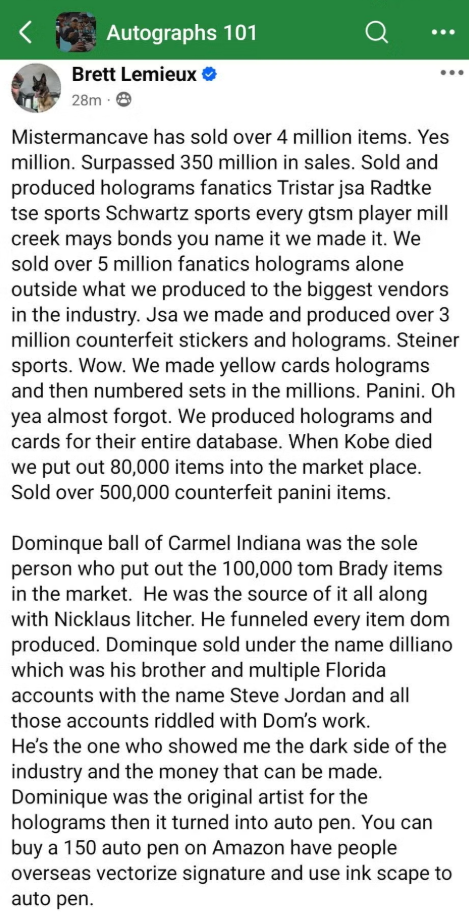
Inside the Indiana Fake Sports Memorabilia Scandal
In a dramatic twist that could fuel the plot of any gripping detective novel, the realm of sports memorabilia has been thrown into disarray with the unmasking of a wide-reaching counterfeit operation traced back to Brett Lemieux, an autograph dealer whose name was synonymous with authenticity—at least until now.
Adding a macabre layer to the narrative, Lemieux, aged 45, was found dead amid the dramatic unfolding of a police raid at his residence in Westfield, Indiana. Authorities believe he died by a self-inflicted gunshot wound as law enforcement swooped in, targeting what has since been revealed as a colossal fake memorabilia conspiracy.
The revelation came crashing down like a prime-time bombshell thanks to a confessional shared by an account allegedly linked to Lemieux in the virtual corridors of “Autographs 101,” a Facebook group where avid collectors and industry insiders converge. The audacious post pulled back the curtain on a broad scheme that churned out over four million fake sports collectibles, masquerading as legitimate items and seducing the market with $350 million in sales.
Lemieux appeared to have molded a niche as the face behind the eyebrow-raisingly cheeky brand, Mister Mancave, promoting it as possessing “the largest framed jersey inventory on the web.” However, the lack of an actual brick-and-mortar presence in Columbus, Ohio—despite claims to the contrary—and its registration in Indiana adds an elusive element to his supposed empire.
Central to the scandal was a sophisticated counterfeiting operation specializing in the duplication of hologram stickers, the small but significant adhesives that testify to the authenticity of signed memorabilia. These holograms, typically issued by venerable authentication giants like Panini, Fanatics, and James Spence Authentics, became the unintended stars of Lemieux’s deceit. Among the fraudulent items were 80,000 pieces allegedly linked to the late Kobe Bryant, a detail that not only deepens the tragedy but casts lingering doubt over many cherished collectibles minted following the basketball legend’s untimely passing in 2020.
The insidious scope of the operation wasn’t bounded by basketball. Lemieux’s Mister Mancave site also listed items like a supposed Aaron Judge-signed baseball at sharply reduced prices, intensifying suspicions. However, it was the counterfeit holograms that perpetuated the illusion of legality.
Reeling from the breach of trust that has rippled across the memorabilia milieu, industry stalwarts like Fanatics are doubling down on technological safeguards, refining their hologram tech to stay ahead of the rule-breakers. It’s a game of high-stakes cat-and-mouse, as former FBI agents and other experts join forces to keep collectors on the side of the angels.
The veracity of Lemieux’s alleged confession and the staggering $350 million figure he boasted remains hotly debated, with peers raising eyebrows and declaring such sales volumes to clash with reality. Still, that speaks little to the chilling reminder of how advanced forgery methods, including now-ubiquitous autopens, blur the once clear line between genuine artifacts and convincing facsimiles.
Within the industry’s crumbling defenses, there’s a sense of hindsight, as some insiders admit Lemieux’s too-good-to-be-true deals were a ticking time bomb. As talk spreads and new names emerge—among them, Indiana’s Dominique Ball and Wisconsin’s Nickolas Litscher, both quick to deny entanglements—a tangled web of suspicion unfurls.
It’s not just a case of one-man’s deceptive misadventure, but rather, a sweeping conspiracy with tentacles in various clandestine businesses, including Ultimate Sports and Athletes One, extending its reach across internet platforms where the unsuspecting fish still swim.
This sordid chapter serves as an undeniable cautionary tale. With narratives so rich with complexity, they practically beg for dramatization. They shine a light on the shadows where counterfeiters lurk and prompt collectors, those sentimental custodians of sports history, to view their treasures with a wary eye. A new era has dawned for the memorabilia market, replete with reinforced checks and evolving strategies, ensuring this is one game the fraudsters will be hard-pressed to win.